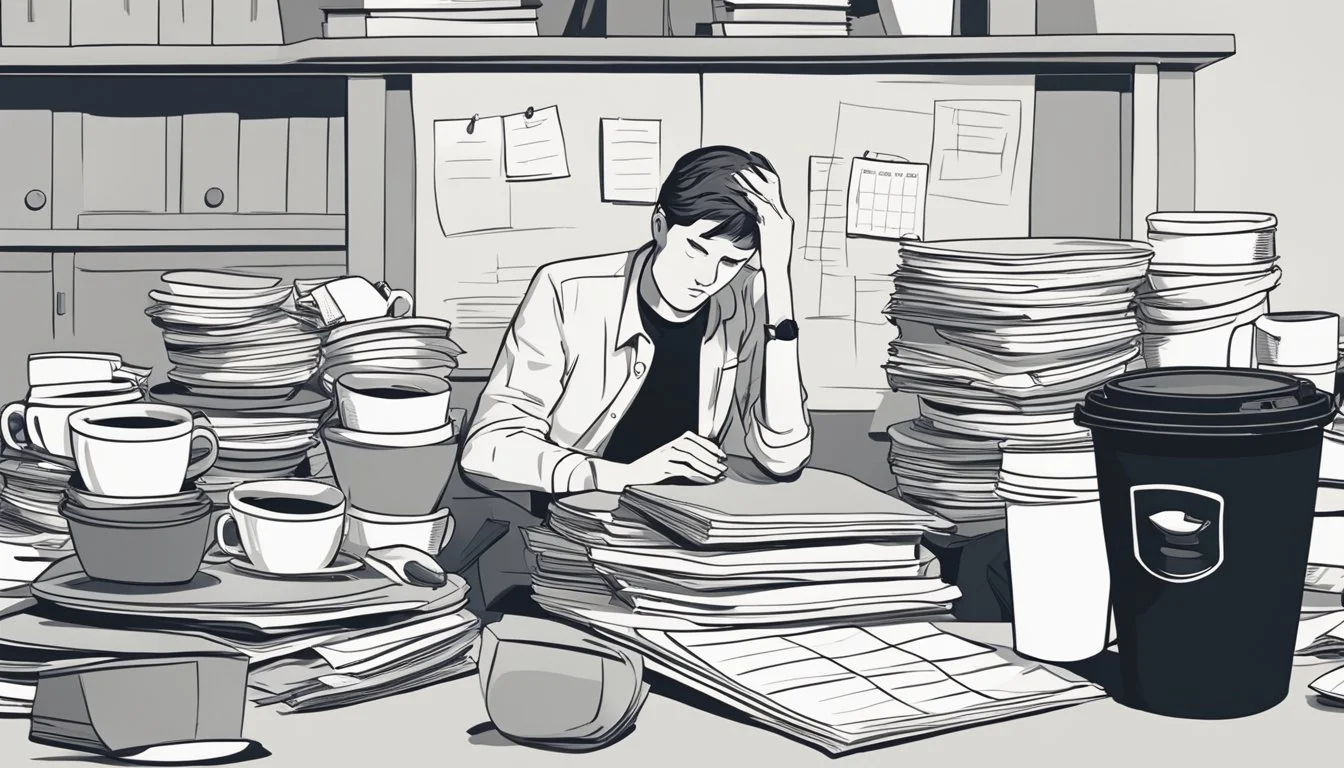How Many Cups of Green Mountain Coffee Per Day Is Too Much?
Understanding Your Limits
Determining the right amount of coffee to drink daily can be a nuanced endeavor, particularly when dealing with popular brands like Green Mountain Coffee, which offers an array of K-Cup flavors and caffeine levels. Green Mountain Coffee provides a variety of options, from light roasts with subtle chocolate and nut notes to classic flavors like hazelnut. The caffeine content in their K-Cup pods ranges between 75 and 150 mg per 8-ounce serving, which is generally considered a standard cup.
Caffeine sensitivity varies among individuals, and so does the recommended daily intake. While coffee consumption has been linked to several health benefits, excessive intake can pose risks, such as increased heart disease risk, according to some studies. Experts suggest moderation is key, and most health guidelines align on safe caffeine consumption levels.
Consumers of Green Mountain Coffee and other caffeinated beverages should be aware of their caffeine intake in relation to the recommended limits. It's generally suggested across various health organizations that up to 400 mg of caffeine a day is safe for most healthy adults. This equates to about 4-5 standard cups of coffee, depending on the specific caffeine content of the blend they are drinking.
Understanding Coffee and Caffeine
Coffee is a complex beverage that affects everyone differently, and its primary active ingredient, caffeine, varies in content across different types and brands. This section examines the components of coffee and specifically unpacks the caffeine content in different coffee products.
Components of Coffee
Coffee comprises several hundred different compounds, but the most significant of these, in terms of physiological effects, is caffeine. In addition to caffeine, coffee contains volatile oils, which are responsible for its aroma and flavor, and antioxidants, which have been attributed a range of health benefits. Green Mountain Coffee, like many other brands, blends various beans to create distinct flavor profiles ranging from vibrant single-origin to balanced espresso blends.
Caffeine Content in Coffee
The amount of caffeine in coffee can vary considerably depending on the type of bean, the roast level, and the brewing method. Typically, an 8 oz cup of brewed coffee contains approximately 95 mg of caffeine, but variations such as espresso and other concentrated forms can contain more caffeine in a smaller volume. As for K-Cups, used in Keurig machines, the caffeine content tends to range between 75-150 mg per 8 oz cup.
Espresso: An espresso shot usually contains about 63 mg of caffeine in a 1 oz serving.
Decaf Coffee: Though not caffeine-free, decaf coffee has significantly less caffeine, about 2-5 mg per 8 oz cup.
Dark Roasts: It's a common misconception that dark roasts contain more caffeine; in fact, the caffeine content may decrease slightly with darker roasts.
Green Mountain Coffee K-Cups: They are specifically designed for Keurig machines, and an average K-cup can contain up to 125 mg of caffeine.
Flavored Coffee: Like the standard blends, flavored coffees, including those like hazelnut or chocolate, maintain similar caffeine profiles unless otherwise specified.
In conclusion, when measuring how many cups of Green Mountain Coffee or other brands one might safely consume per day, it's essential to consider the varying levels of caffeine content. Overconsumption can lead to unpleasant side effects, given caffeine is a powerful stimulant. Knowing one's limit – often considered to be up to 400 mg of caffeine per day for the average adult – helps to enjoy coffee responsibly.
Health Effects of Coffee
Coffee is a complex beverage that can have varying effects on human health. Consuming it in moderation is generally considered safe for most healthy adults, but excessive intake may increase certain health risks.
Benefits of Coffee Consumption
Coffee contains antioxidants which play a role in protecting the body from oxidative stress and may reduce the risk of several medical conditions. Studies indicate that adults who consume three to four cups of coffee per day may have a lower risk of developing type 2 diabetes and certain types of cancers. Moderate coffee consumption is positively associated with cardiovascular health, potentially reducing the risk of stroke and death from cardiovascular disease.
Reduction in disease risk: Coffee consumption has been linked to a decreased risk of liver disease.
Protection for the central nervous system: Some research suggests coffee intake could be associated with lower rates of certain neurological disorders.
Risks of Excessive Coffee Intake
However, overconsumption of coffee, generally more than 400 milligrams of caffeine daily, can lead to an array of adverse effects. This is equivalent to about four 8-ounce cups of Green Mountain Coffee, assuming each cup contains 100 mg of caffeine.
Cardiovascular issues: The risk of heart disease and hypertension may increase with high coffee consumption.
Central nervous system effects: Insomnia, restlessness, nervousness, and irritability can become pronounced with overuse.
Gastrointestinal discomfort: An upset stomach or vomiting are common with excessive caffeine.
Adverse reactions: In rare cases, high caffeine intake may provoke seizures or exacerbate certain medical conditions.
It's important to note that children and those with existing medical conditions such as cardiovascular disease may be more vulnerable to caffeine's effects and generally should consume less.
Safe Consumption Levels
When considering how many cups of Green Mountain Coffee are safe to drink daily, one must take into account the caffeine content in each serving and compare it to the established safe consumption thresholds.
FDA Guidelines on Caffeine
The U.S. Food and Drug Administration (FDA) has determined that 400 milligrams of caffeine per day is generally considered safe for most healthy adults. This amount equates to about four eight-ounce cups of coffee. It is important to note that individuals may vary in their sensitivity to caffeine, and some may require a lower intake to avoid adverse effects.
How Much Green Mountain Coffee Is Safe?
A standard eight-ounce cup of Green Mountain Coffee typically contains approximately 100 to 200 mg of caffeine, depending on the specific roast and blend. Therefore, consuming up to two eight-ounce cups of Green Mountain Coffee would provide about 200 to 400 mg of caffeine, aligning with the FDA's guidelines for daily caffeine intake. Users are advised to monitor their total daily caffeine consumption from all sources to ensure it does not exceed recommended levels.
Factors Influencing Caffeine Sensitivity
Caffeine sensitivity varies from person to person, and it is influenced by individual metabolism and the consumption of other foods and drinks. Understanding these factors can help one gauge how many cups of Green Mountain Coffee may be suitable on a daily basis.
Individual Differences in Metabolism
Every individual metabolizes caffeine at a different rate. Factors such as genetics, age, weight, and overall health play a significant role in this process. For instance, some people possess a genetic makeup that enables them to process caffeine quickly, thereby reducing the sensitivity to its effects. Conversely, slow metabolizers may experience heightened sensitivity, even with small quantities of caffeine. This means that while one person may comfortably consume several cups of Green Mountain varieties like Breakfast Blend or Hazelnut, others might find themselves sensitive after just one cup.
Dark Magic and Half-Caff: The metabolism of caffeine from different blends, such as the robust Dark Magic or the moderate Half-Caff, can influence an individual's reaction. The Half-Caff blend, with its reduced caffeine content, may be more suitable for those with higher sensitivity levels.
Impact of Other Foods and Drinks
The impact of caffeine can be affected not only by coffee itself but also by other consumables like energy drinks, cola, chocolate, and soft drinks. These items contain varying amounts of caffeine, which can compound the effects experienced from a cup of coffee.
Sugar and Sweeteners: Adding sugar or sweeteners to Green Mountain Coffee can alter how the body responds to caffeine. These additions can lead to a more immediate energy spike, followed by a rapid decline, which some may mistake for increased caffeine sensitivity.
Cream: The inclusion of cream or other dairy products can slow the absorption of caffeine, potentially moderating its effects on the body.
Consuming other caffeine-containing foods or beverages alongside Green Mountain Coffee, such as soda or chocolate, can inadvertently increase one's overall caffeine intake, thereby exacerbating sensitivity symptoms. Therefore, it's crucial to consider total daily caffeine consumption from all sources, not just coffee.
Alternatives to High-Caffeine Coffee
For individuals seeking to reduce their caffeine intake, exploring alternatives to high-caffeine coffee, such as Green Mountain Coffee, can be beneficial. These alternatives include options with lower caffeine content as well as non-coffee substitutes that can cater to various preferences and dietary requirements.
Lower Caffeine Coffee Options
Brands like Green Mountain offer a range of half-caff options, where the caffeine content is significantly reduced, catering to those who enjoy the taste of coffee but wish to limit their intake. For example, Green Mountain's Half-Caff variant retains the full-flavor profile with only half the caffeine. Additionally, decaf coffee provides an almost caffeine-free alternative while maintaining the expected coffee experience.
Select Green Mountain Lower-Caffeine Options:
Half-Caff: A balanced blend maintaining robust flavor with 50% less caffeine.
Vermont Country Blend Decaf: A mix that captures the essence of Vermont with a rich, smooth flavor.
Non-Coffee Alternatives
Tea offers a diverse palate with varying levels of caffeine. For instance, Matcha Tea provides a sustained energy release with a significantly lower level of caffeine than traditional coffee. Additionally, herbal teas, such as chamomile or peppermint, are naturally caffeine-free and can provide a soothing alternative without any caffeine.
Popular Non-Coffee Alternatives:
Green Tea: Contains less caffeine and is rich in antioxidants.
Chicory Coffee: A brewed drink with a similar taste to coffee but without caffeine.
Specialty Coffee Substitutes: Blends such as MUD/WTR offer a mix of ingredients like black tea and cacao for a reduced-caffeine experience.
Choosing alternatives to high-caffeine coffee such as Green Mountain's Nantucket Blend or Sumatra Reserve can help moderate caffeine consumption while also providing the opportunity to discover new flavors and rituals. Whether one prefers a lower-caffeine coffee or a completely different beverage, the market offers a variety of options to suit different tastes and needs.
Identifying and Managing Overconsumption
Green Mountain Coffee is a popular brand many enjoy daily. However, as with any source of caffeine, it's crucial to recognize when one might be consuming too much and understand how to manage and reduce intake if necessary.
Symptoms of Excessive Intake
Individuals who consume excessive amounts of Green Mountain Coffee may experience a range of symptoms indicative of overconsumption. Common signs include:
Anxiety: A pronounced feeling of nervousness or worry, often with physical symptoms like increased heart rate.
Sleep Disturbances: Trouble sleeping or insomnia can be a direct result of too much caffeine.
Gastrointestinal Issues: An upset stomach may occur, leading to discomfort or nausea.
Neurological Symptoms: Headaches, irritability, and restlessness are often reported.
Physical Fatigue: Ironically, despite caffeine’s stimulating effects, some may experience fatigue as the stimulating effects wear off.
Reducing Coffee Consumption
Individuals who notice these symptoms may benefit from cutting back on their caffeine intake. Strategies to reduce consumption include:
Gradual Reduction: Limit intake slowly over time to prevent withdrawal symptoms.
Mindful Choices: Opt for decaffeinated versions or those with less caffeine.
Hydration Focus: Replace some coffee with water to help alleviate dehydration that can compound symptoms.
Avoid Added Sugar: Reducing added sugar in coffee can decrease the potential for added restlessness and energy spikes.
Set Limits: Establishing a cut-off time for consuming caffeinated beverages can ameliorate sleep issues.
By recognizing the symptoms of excessive intake and employing strategies to reduce consumption, individuals can enjoy Green Mountain Coffee safely without overstepping the bounds into negative effects on their health.
Consumer Considerations
When consumers choose their daily coffee intake, they must consider the caffeine content listed on the Green Mountain Coffee packaging and the method of coffee preparation, as these determine the amount of coffee that may be considered excessive.
Label Reading and Understanding Serving Sizes
Each Green Mountain Coffee product comes with a label that specifies the caffeine content, usually measured in milligrams. For instance, standard Green Mountain K-Cups contain between 75 and 150 mg of caffeine per 8 oz cup. When considering consumption limits, it's critical to understand that health experts generally recommend a maximum of 400 mg of caffeine per day for most adults. Therefore, customers should track how many K-Cups they're using and calculate their caffeine intake accordingly.
Serving sizes are also an important aspect of label reading. While a single K-Cup is designed for one serving, those using other brewing methods, such as a French press, need to be mindful of how much ground coffee they're using per cup.
Coffee Preparation Methods
Different preparation methods can lead to variations in caffeine content. Green Mountain Coffee, when brewed using a Keurig, will have a consistent caffeine level as per the product label, due to the standardized nature of K-Cups. However, methods like French press or drip machines may yield a stronger or weaker cup depending on factors such as the amount of coffee used and brewing time.
It's worth noting that darker roasts like rich dark roasts and medium roasts, as well as flavored options such as caramel vanilla, contain less caffeine than light roasts, despite their stronger flavor. As such, the choice of roast level can impact how many cups one can enjoy per day without exceeding recommended caffeine levels. Customers with health concerns, like high blood pressure, should be particularly cautious and may want to consult with a healthcare provider about their caffeine intake from Green Mountain Coffee.






